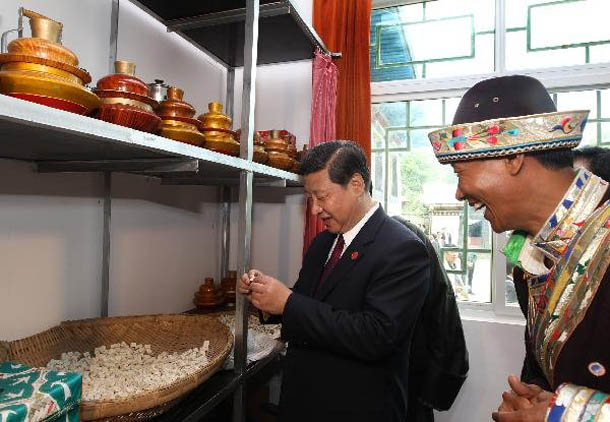Kongpo Nyintri (Ch: Nyingchi prefecture) region borders Bhutan, Myanmar and India. Xi is in Tibet on the anniversary of what the Communist Party of China calls its “peaceful liberation of Tibet.” His visit to Tibet precedes his expected rise to the office of President and head of the Communist Party of China next year.
During his time there, he went to the town of Kongpo Nyintri region (Ch: Bagyi village) and met local people, encouraging them to “shun separatism,” according to The Times of India. He also met with top officials in the area’s government and military officials heading the Peoples’ Liberation Army unit there, encouraging them to keep advancing the development in the prefecture, to promote tourism, and to protect the environment there.
Before traveling to Nyintri county, Xi was in Shigaste. Another Chinese official, ambassador to Nepal Yang Houlan, said recently that Tibet has been transformed from a place of feudalism and poverty to a place of civilization and prosperity.
He claimed that since China’s “liberation” of Tibet, the economy and the illiteracy rate have improved in Tibet. He also claimed the government of China facilitated religious freedom and the preservation of traditional culture, and that environmental protection measures had been put in place.
China’s goal is to transform the nomadic land in Tibet into urbanized, industrialized land. Around 300 000 families in Tibet, involving 1.43 million nomads and farmers, were moved into new or fixed settlement homes since 2006.
According to the so called regional government, another 185,000 families are expected to move into new homes by 2013. This vast initiative led by the Chinese government has been criticized by a bunch of associations as a threat to the Tibetan nomadic culture.
During his time in the capital of Tibet, Lhasa, Xi warned Buddhist monks to break with the so called "separatist forces." Speaking at the ancient Tibetan "Jokhang" temple in the capital -- the temple where Buddhist monks staged a protest in front of international reporters in 2008 -- Xi warned over a hundred monks to stay in line with the 90-year-old communist Party.
"The Party and the government will not forget your positive contributions," Xi, who also ironically considers religion as a poison for social development, said, calling them to carry on the patriotic spirit and strive for Tibet's development and the improvement of peoples' living standards.
However, the Communist Party leadership in Tibet has long been challenged with international criticisms. Many Tibetans bridle at Han Chinese control and that resentment burst out in March 2008 with deadly crackdowns in the capital Lhasa that spread to all other parts of Tibet.


![Tibet has a rich history as a sovereign nation until the 1950s when it was invaded by China. [Photo: File]](/images/stories/Pics-2024/March/Tibet-Nation-1940s.jpg#joomlaImage://local-images/stories/Pics-2024/March/Tibet-Nation-1940s.jpg?width=1489&height=878)
















